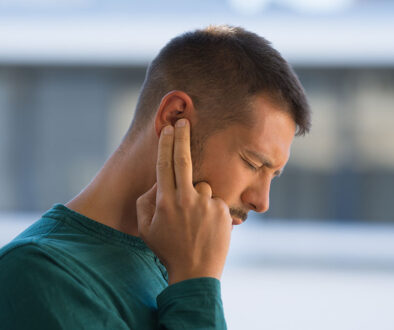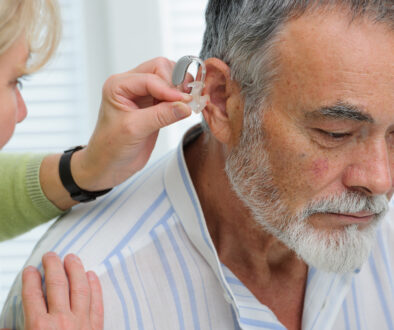10 Tips on How to Live with Hearing Loss
Updated March 2025
In this article:
The sounds of what you love shape your most precious memories: your child’s first words, listening to your favorite music, and enjoying conversation and fellowship with cherished friends.
But when you have hearing loss, those special moments can become tarnished by the difficulty of trying to understand what is being said or missing important information. Hearing loss is very common, and living with it is incredibly challenging.
For the majority of those who are hard of hearing, a hearing aid can go a long way toward helping them communicate effectively with others.
At Raleigh Capitol Ear, Nose, Throat & Allergy, our extensive audiology services mean we can help you face these challenges. We’ve helped hundreds of Raleigh and area residents establish better hearing through hearing aids—and we recognize that when it comes to these devices, one size does not fit all. We understand the subtleties involved because everyone’s hearing loss is slightly different, and customization ensures better results. If you’re having trouble understanding what is being said or if you feel like most people are mumbling, we encourage you to schedule an appointment to come in for a hearing test.
For this article, we’ll take a closer look at the multifaceted areas of hearing loss, including its most common causes, how to choose the right hearing aid and whether or not you should attempt to buy hearing aids on the internet.
But first, we’ve compiled 10 important tips on how to live with hearing loss.
Our 10 Tips on How to Live With Hearing Loss
1. Speak to our physicians and audiologists about selecting the right hearing aid.
Not all hearing aids are alike. It may be tempting to purchase a hearing aid online, but no one can match the expertise and experience of a trained audiologist in our Raleigh office who can give you hearing tests to determine the exact cause of your hearing loss. There are also several options available, such as the bone-anchored hearing aid (BAHA).
All of our audiologists have advanced degrees and extensive clinical training. They understand the vital importance of finding the right hearing aid to help you communicate more effectively again.
2. Ask people to face you when they speak.
This will enable you to pick up on any visual cues concerning what is being discussed. It will also help you read facial expressions. (For more information, see number seven below.)
3. Let your friends, coworkers, and relatives know what works and what doesn’t.
Even those with the best intentions sometimes miss the mark. Often, people believe that simply shouting will solve the issue, which is not always the case. Explain to those you work with and your loved ones the best way to communicate with you.
For example, you may not be able to hear clearly when someone is talking to you from another room, or perhaps crowded restaurants make you uncomfortable because it’s difficult to understand the conversation. Most people want to do what they can to help you!
4. Consider an assistive listening device.
These are useful in areas where there is a lot of background noise, such as airports, restaurants, theatres and conference rooms. They work by amplifying the sound of the speaker, making it rise above any other sounds.
If you have any questions about assistive listening devices, we encourage you to contact us. Depending upon your type of hearing loss, it may not be the best option. That’s why we’re dedicated to providing an individualized approach to our audiology services. You can trust us to find a solution that will enable you to hear clearer.
5. When you’re out in public, be aware of situations that make it difficult to communicate.
For example, if you’re in a restaurant, tables near the kitchen, bar or even beside a large group of people would not be appropriate. Try to select the quietest area to establish communication.
6. Turn off the TV when not watching it.
Cutting down background noise can help you hear others. It’s simply too easy to leave the TV on out of habit. You should also ask others to turn down the music when not actively listening to it.
7. Be aware of non-verbal cues.
Did you know that a lot of communication depends upon body language? By training yourself to be more aware of gestures you can easily frame the context of what was being said.
8. Don’t get frustrated.
It’s very easy to get frustrated when you’re having difficulty communicating with others. Realize that you are not alone, and hearing loss is very common.
When you’re frustrated, we want you to speak to us. Often, we can help you find new, even more effective strategies that will aid your communication and enhance your world. Our patients are at the center of all that we do, and we’re dedicated to putting your needs first.
9. Take advantage of closed captioning services.
We encourage you to set your TV for closed captioning services. You can also use closed captions on your phone.
10. Get your services from an audiologist, not a hearing aid dispenser.
There are several differences between an audiologist and a hearing aid dispenser (We go into detail in our previous blog post. Essentially, a hearing aid dispenser does not have the extensive education and training that an audiologist receives.
All of our audiologists have earned advanced educational degrees and have certifications that attest to their experience and expertise. You can trust us with your care.
Raleigh Capitol Ear, Nose, Throat & Allergy Offers Hearing Tests and Customized Care to Help You
Hearing loss is frustrating and has a long-lasting impact on your day-to-day life. Be proactive and protect your hearing. If your hearing tests show that you have hearing loss, our certified, experienced audiologists will be glad to help you. Please contact us to schedule an appointment today.
Five Common Causes of Hearing Loss
Informative National Hearing Loss Statistics
At Raleigh Capitol Ear, Nose, Throat & Allergy, we understand that you are not just a number. We know that you need—and deserve—the highly personalized care that our board-certified ENT doctors in Raleigh have been providing for decades. We’re dedicated to helping you overcome the challenges of hearing loss.
But we also want you to realize that you are not alone in these challenges. You may realize that hearing loss is common, but do you know to what extent?
About 15 percent of American adults have trouble hearing —this translates to roughly 37.5 million people. Those who are 60 to 69 years old are much more likely to have hearing loss. In fact, 25 percent of those between 65 to 74 have difficulty hearing to the extent that it is disabling. It’s also the third most prevalent health condition among older adults.
But older adults aren’t the only ones affected. It’s estimated that 30 out of 1,000 school-age children have hearing loss.
We’ve already reviewed some useful tips on how to live with hearing loss, so now, let’s explore the most common reasons behind hearing loss.
5 Common Causes of Hearing Loss
1. Aging
More than half of those 75 years and older have some type of hearing loss.
Presbycusis is the medical term for hearing loss that gradually occurs due to age. As the body ages, changes in the middle ear and the neural pathways can cause age-related hearing loss. These changes can include the loss of hair cells, which serve as sensory receptors in the middle ear.
2. Illness or Injury
Diseases that affect the blood supply to the ear—such as heart disease, vascular diseases or high blood pressure—can contribute to hearing loss. Traumatic injuries that may also affect hearing include:
- Head injuries – particularly skull fractures and concussions
- Sudden exposure to a loud noise – such as a gunshot or explosion
- Injury to the eardrum or middle ear
We have worked with several patients who have had ear injuries such as a ruptured eardrum and our leading physicians can work closely with you to help, providing timely and effective treatment.
3. Structural Problems Within the Ear
These problems may include malformation of the outer ear, eardrum, ear canal, tiny bones within the ear or the inner ear. It may also include ear canal stenosis—the narrowing of the ear canal.
4. Medication
Certain medications, particularly those used to treat cancer, heart disease and serious infections, may damage the ear, increasing the risk of hearing loss.
Medications that damage the ear are known as ototoxic medications. There are more than 200 of them on the market today. If you have questions or concerns over whether or not a medication is ototoxic, please speak with us.
5. Noise
Worldwide, more than 1 billion teenagers may be at risk of developing hearing loss due to noise. Phones and other audio devices combined with loud venues such as nightclubs or sporting arenas have created a perfect storm for hearing loss among younger people.
It’s estimated that more than 50 percent of those between the ages of 12 to 35 have been exposed to unsafe noise levels as a result of music players or entertainment devices. Exposure to sounds that are louder than 85 decibels can cause hearing loss. For comparison, 85 decibels equates to the sound of a lawnmower or power tools.
If you are concerned that you, your child, or someone you love may be experiencing signs of hearing loss, please contact us.
What Type of Hearing Aid Should You Choose?
Just as technological innovations have created an almost infinite array of phone and tablet choices, hearing aids now come in multiple varieties, from those with Bluetooth capability to those specifically designed to make conversations easier.
There are even bone-anchored hearing aids that utilize titanium implants to direct sound vibrations to the inner ear.
When it comes to hearing aids, it’s important to speak with a professional who can provide accurate advice.
While both audiologists and hearing aid dispensers can evaluate hearing and fit hearing aids, audiologists must have a doctoral or master’s degree, pass national and state exams, and have more than 1,000 hours of clinical training.
By comparison, hearing aid specialists generally have from six months to 2 years of supervised training. An audiologist, particularly one affiliated with an otolaryngology practice in Raleigh like Raleigh Capitol Ear, Nose, Throat & Allergy, is best suited to provide the level of expertise needed to help you find the right hearing aid.
Why Should You Visit an Audiologist With An Ear, Nose and Throat Practice?
Certain hearing problems may be caused by an obstruction or structural problems with the ear itself, and one of our physicians can work with the audiologist to find the best solution.
At Raleigh Capitol Ear, Nose, Throat & Allergy, we consider this to be a vital part of our team-based approach to medicine.
How Can I Select the Hearing Aid That’s Right for Me?
The following are some steps that will help you work with our audiologists in Raleigh to select the appropriate hearing aid:
- Make a list of items that are important for you to have in a hearing aid. You may wish to consider how active your lifestyle is and whether or not you want to have a hearing aid featuring the latest technology.
- Consider what type of hearing aid may be best for you. Would you prefer an in-the-ear hearing aid, or would it be easier for you to adjust one that fits behind the ear?
- Ask your audiologist what type of hearing loss you have. Certain hearing aids work better with certain types of hearing loss.
- Consider where you have the most difficulty hearing. Do you find it difficult to understand when you are in a crowded restaurant? Do you find it hard to hear during conference room meetings?
- How much are you willing or able to spend? Hearing aids vary widely in cost, and some insurance companies will not cover all (or any) of the cost involved. Hearing aid prices can range from a few thousand to several thousand dollars per hearing aid.
- Is there a “test drive” period? Many audiologists will allow you to have a trial period to see how well the hearing works in various settings. Be sure to ask about the return policy, and be sure to understand their procedures for returning a hearing aid or getting it adjusted.
- How important is technology to you? Almost any hearing aid style can be customized with the latest technology. However, the more advanced the technology, the more expensive the hearing aid becomes. Decide how important certain features are to you, such as digital speech enhancement, feedback suppression and wireless capabilities.
Most importantly, realize that the best hearing aid in the world will not help if it does not fit or if it is not adjusted correctly. That is another reason why it is so important to work with an audiologist that you trust.
Should You Buy Your Hearing Aid Online?
Eyeglasses, vitamins, groceries…almost everything can be bought online. With retail giants like Amazon selling items ranging from computers to emergency medical supplies, it may seem logical to save money by purchasing your hearing aids online.
While it may seem like you’re getting a deal, our audiologists caution that there’s much more to consider than merely getting a bargain. Purchasing a less expensive hearing aid online may actually cost you more money in the long run — and your online “bargain” may not resolve your hearing problems.
Can You Purchase Hearing Aids Online? 9 Things You Should Consider
Of course you can, but the question is should you? Here are a few things you should consider before you put a new hearing aid in your shopping cart:
1. A Hearing Aid Does Much More Than Boost Volume
Our audiologists want you to know that there’s a big difference between a hearing aid and a sound amplifier.
An amplifier simply makes sounds louder. While that may seem like the simple solution, there are many more subtleties that should be considered.
For example, a sound amplifier won’t be a lot of help when you’re in a crowded restaurant or you’re trying to understand someone calling to you from another room.
An audiologist is able to recognize these subtleties and target the exact type of hearing aid to best address your individual needs. That’s impossible to do when you’re shopping online.
2. Online Purchases Aren’t Customized to Your Hearing Test Results
Our audiologists in Raleigh do much more than fit hearing aids. They conduct detailed hearing tests and use the results to determine the exact type of hearing aid that will benefit you most.
They are able to work with your local ENT physician at Raleigh Capitol Ear, Nose, Throat & Allergy to help you.
If you order your hearing aid online, you’re missing out on the benefits of this extensive expertise.
3. A Hearing Aid May Not Solve Your Problem
Our audiologists work closely in conjunction with our ear, nose, and throat doctors. This is vital to provide the kind of comprehensive care you need and deserve.
It’s important to go to an audiologist who is affiliated with a medical practice because hearing loss can also be caused by structural problems or deformities of the ear itself. These problems can only be addressed by an ENT.
If the ENT discovers there is a physical problem with your ear, then a hearing aid will not solve your problem. If that’s the case, you may need surgery to alleviate your problem completely.
4. You Won’t Have the Hearing Aid Calibrated to the Right Setting
The best hearing aid in the world is useless if it’s not set correctly. If it was purchased online, audiologists may not have access to the sophisticated software that accompanied the hearing aid. As a result, you may be saving dollars, but getting no benefit.
Hitting the “sweet spot” of your hearing aid setting may require additional visits. This is impossible if you’ve purchased your hearing aid online.
5. When You Purchase Online You Don’t Know About the Certifications of the Dispenser
There are several differences between an audiologist and a hearing aid dispenser. While a dispenser’s certifications and requirements vary from state to state, audiologists are required to have advanced education — usually the equivalent of a doctor’s or master’s degree — to fit, calibrate and recommend hearing aids. Dispensers do not have to fulfill these more rigorous qualifications.
When you’re online, it’s more difficult to determine who is behind your purchase. Do you really want to take a chance with your hearing?
6. Online Retailers May Not Show You All Your Hearing Aid Options
Forget the high-pitched squealing that used to come from your grandmother’s hearing aid. Today’s devices are smarter and more sophisticated than ever. Today’s devices allow you to connect your hearing aid to your phone or to your iPad — and this is just a small sampling of what is available.
An audiologist, particularly one associated with local ENTs at Raleigh Capitol Ear, Nose Throat & Allergy, will have up-to-date information on the latest technology, and they will help you find the best option to match your lifestyle.
7. You May Be a Better Candidate for a Different Type of Hearing Aid
Depending upon your situation, you may be a candidate for a bone-anchored hearing aid (BAHA). This type of hearing aid uses bone conduction to relay sound signals directly to the brain.
If you were purchasing your hearing aid online, you’d have no chance to evaluate any other options, such as BAHA, that may be available to you.
8. You Can’t Ask Extensive Questions Online
Sure, retailers may have a chat window where you can ask questions, but what if you need a follow-up explanation? Will you get the same representative you had before?
While online shopping has made wonderful innovations possible for today’s consumer, there is often no substitute for having a one-on-one conversation in person. If you are entrusting your precious hearing to someone, shouldn’t it be a professional who is ready to answer any questions and follow up as needed? That’s why you deserve the customized service of a certified audiologist in Raleigh at Raleigh Capitol Ear, Nose, Throat & Allergy.
9. You Can’t Tell If It’s Going to Be a Great Fit
You can order clothes online that say they’re the right measurements and perfect color, but when they arrive and you actually try them on, it could be a different story.
If this is a concern for clothing or shoes, shouldn’t it be even more so when it involves a vital part of your health care?
While most online retailers will provide an exchange for another one, wouldn’t it be easier just to handle something like that in person? While ordering online may appear to be convenient at first, this benefit wears thin if you have to make repeated changes.
Our audiologists are more than mere experts in their field; they’re also great listeners. This means that they will acknowledge your cares and concerns and–even more importantly–always take time to answer your questions. You won’t have to worry about a constant struggle to find the right size. Remember: You have our expertise on your side.
How To Select the Hearing Aid That’s Right for You
So you’ve decided you’re not going to purchase your hearing aid online. Excellent.
Now what? Where do you go from here?
Your first step should be to go to one of our ENT physicians to be sure you understand the underlying cause of your hearing loss. Then, a certified audiologist will work with you to determine what type of hearing aid would be best for you. Often, this may involve trying different types of devices before you find the one that suits you best.
Rest Assured: We Work With You So You Can Hear Clearly and Improve Your Quality of Life
When you work with Raleigh Capitol Ear, Nose, Throat & Allergy, you have an entire team of experienced professionals working for you who are leaders in their field. For decades, we have helped Triangle area residents with hearing loss, and our audiologists have helped thousands determine which hearing aid is a perfect fit.
If you’re having difficulty with hearing, we encourage you to schedule an appointment for a hearing test.
Key Takeaways:
- Hearing loss is the third most prevalent health condition among older adults.
- There are several strategies that can help you deal with hearing loss, including:
- Using closed captioning
- Facing people when they’re speaking to you
- Eliminating background noise
- Making use of gesturing and body language
- Speaking to your loved ones about the best ways they can communicate with you
- The most common reasons for hearing loss are:
- Age
- Illness or injury
- Medications
- Noise exposure
- Structural problems with the ear
- While both hearing aid dispensers and audiologists can provide hearing aids, only certified audiologists have the advanced education and credentials to help ensure you have the hearing aid that’s right for you.
- Audiologists must have a doctoral or master’s degree, pass national and state exams, and have more than 1,000 hours of clinical training
- Hearing aids have become more sophisticated and feature advanced technology.
- While you can purchase hearing aids online, this is not a good option; these online retailers have no way to adjust or customize these hearing aids to accommodate your type of hearing loss.
- Only one of our licensed audiologists can provide the extensive answers and options you need.
The content within this article and others on this website is only for educational purposes and should not be considered as medical advice. For any questions or concerns, please consult with your healthcare provider.
====
Sources:
American Speech Language Hearing Association, “Hearing Aids,” https://www.asha.org/public/hearing/hearing-aids/?srsltid=AfmBOorqIT77JLtOZTwBi31CHrFtvlUN4vj1aWFQ8e0kOCCmzGDAIpZJ
Centers for Disease Control, “Noise-induced Hearing Loss,” https://www.cdc.gov/niosh/noise/about/noise.html
Hearing Language Association of America, “Hearing Loss 101,” https://www.hearingloss.org/hearing-help/hearing-loss-basics/
National Institute on Deafness and Communication Disorders, “Age-Related Hearing Loss,” https://www.nidcd.nih.gov/health/age-related-hearing-loss
World Health Organization, “1.1 Billion People at Risk of Hearing Loss,” https://www.who.int/vietnam/news/detail/10-03-2015-1.1-billion-people-at-risk-of-hearing-loss




